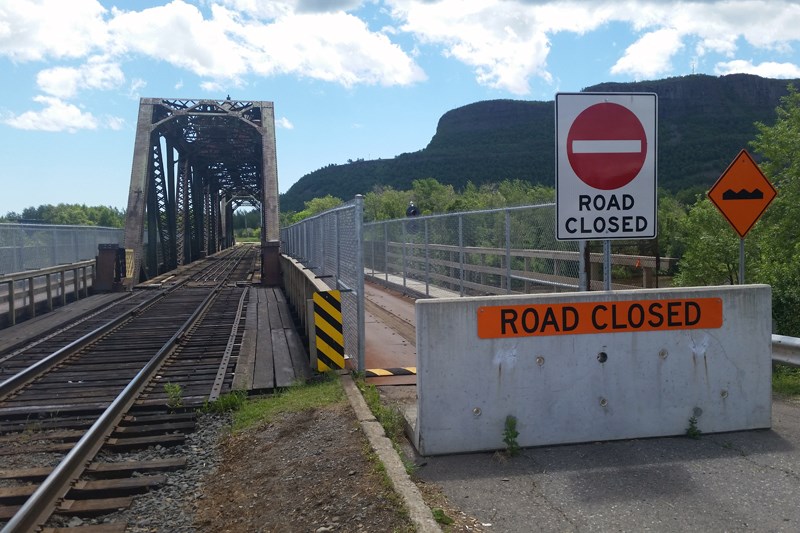The ball’s in CN Rail’s court as to whether it intends to fix and reopen a 109-year-old bridge to car and trucks between Thunder Bay and Fort William First Nation.
CN is awaiting word if the Supreme Court of Canada will hear its case over a century-old contractual obligation to maintain and keep open the James Bridge to vehicle traffic.
A Nov. 16 ruling from the Court of Appeal of Ontario dismissed CN’s request to stay - or postpone – an earlier appeals court decision from last June ordering that the bridge be repaired and reopened to vehicles after the railway blocked access five years ago.
The bridge, which spans the Kaministiquia (Kam) River and directly connects the two communities, is a combined railway, vehicle and pedestrian structure.
CN declared the bridge off-limits to vehicles after vandals set the bridge on fire in October 2013. But within days, CN did repairs that allowed its freight trains to move across the span.
The lack of access has been a major headache for residents of both communities, forcing them to make a 10-kilometre detour via a main highway. It also increases response times for emergency vehicles coming from Thunder Bay to the First Nation.
What’s followed is a four-year legal fight between the City of Thunder Bay and CN over the railway’s requirement to adhere to a 1906 agreement.
The agreement, signed between the Grand Trunk Pacific Railway (now CN) and the Town of Fort William (now the City of Thunder Bay), guaranteed a “perpetual right” for street railway, vehicles, and foot traffic to cross the bridge.
In seeking relief from the agreement, CN contends the structural repairs required to reopen the bridge for vehicles is beyond the scope of its maintenance obligation.
“CN has and continues to assess the various options to comply with the Court of Appeal’s reversal of the initial order,” responded CN spokesman Jonathan Abecassis in an email, on the Ontario appeal court’s denial of CN’s motion for stay.
“However, CN believes the Supreme Court’s guidance is still required to fully assess the extent of its obligations, if any.”
The Supreme Court will rule in early 2019 – likely February – whether it will hear CN’s appeal.
Thunder Bay Mayor Keith Hobbs still insists that CN must live up to the conditions of the 1906 agreement.
“The court is clear that CN must fix its bridge now,” he said in a November 19 news release.
“Over the past four years the city has sought to have CN Railway honour its commitments under the 1906 agreement to repair and reopen its bridge. Council remains resolved in its expectations, which have been confirmed by the court again.
“CN is fully responsible for its bridge, which is an important connection between Thunder Bay and Fort William First Nation. CN must obey the court order and act now. CN has run out of reasons to continue to delay.”
In the Nov.16 ruling, Justice Janet Simmons wrote that, up until the time of the 2013 fire, CN continued performing bridge repairs and upgrades to allow vehicles to cross as it had for more than 100 years under the agreement, “without apparent difficulty.”
Not once, she said, did CN seek a court order that it was incapable of performing this work.
Since last summer’s appeals court ruling, Simmons wrote CN took steps toward repairing the bridge by selecting an engineering firm, which will deliver construction drawings by Dec. 15. The estimated reconstruction cost ranges between $4 million and $6 million.
In denying the stay, Justice Simmons further noted that time wasn’t of the essence to CN.
The appeals court decision was rendered on June 11, but CN didn’t file an application for leave to appeal to the Supreme Court until Aug.20. That application was finally filed in mid-October.
Simmons wrote CN “failed to move more expeditiously,” thus increasing the potential for serious impacts on both communities by delaying the reopening of the bridge.
According to CN’s timetable, once the two-month tendering process is done, bridge construction could take four to eight months, weather permitting, and delay the reopening of the bridge until 2020.
“To that extent, I consider that CN has contributed to the situation it is in,” wrote Simmons, who further cast doubt, in her opinion, that CN will be successful in its leave for appeal to the Supreme Court.




